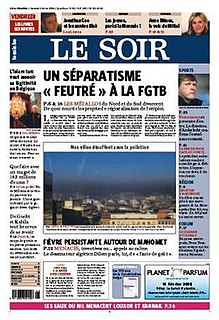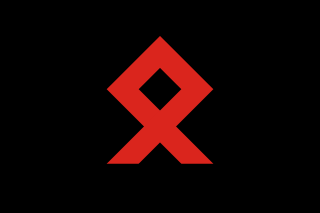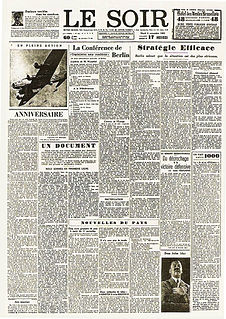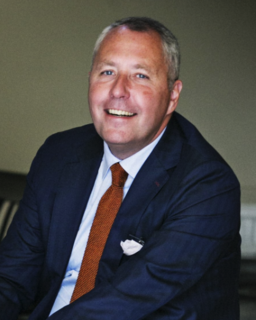
Le Soir is a French-language daily Belgian newspaper. Founded in 1887 by Emile Rossel, it was intended as a politically-independent and traditionally Liberal source of news. It is one of the most popular Francophone newspapers in Belgium, competing with La Libre Belgique, and since 2005 has appeared in Berliner format. It is owned by Rossel & Cie, which also owns several Belgian news outlets and the French paper La Voix du Nord.

The Order of Flemish Militants – originally the Flemish Militants Organisation – was a Flemish nationalist activist group in Belgium defending far-right interests by propaganda and political action. Established in 1949, they helped found the People's Union in 1954, a Belgian political party. The links between the extremist VMO and the VU lessened as the party moved towards the centre. In later decades the VMO would become linked to neo-Nazism and a series of paramilitary attacks on immigrants and leftists before disappearing by the late 1980s.

The Belgian Resistance collectively refers to the resistance movements opposed to the German occupation of Belgium during World War II. Within Belgium, resistance was fragmented between a large number of separate organizations, divided by region and political stances. The resistance included both men and women from both Walloon and Flemish parts of the country. Aside from sabotage of military infrastructure in the country and assassinations of collaborators, these groups also published large numbers of underground newspapers, gathered intelligence and maintained various escape networks that helped Allied airmen trapped behind enemy lines escape from German-occupied Europe.
Bases Autónomas was a Spanish neo-Nazi group, later moving to France, and known for its youthful membership and its violent rhetoric and propaganda.
Benoît, Baron de Bonvoisin is a Belgian far right activist.
Bloed, Bodem, Eer en Trouw was a Flemish neo-Nazi group, created in 2004 from a splinter of the Flemish branch of the international Nazi skinhead organization Blood & Honour.

François Duprat (1940–1978) was a writer, a founding member of the Front National party and part of the leadership until his assassination in 1978.
The far-right tradition in France finds its origins in the Third Republic with Boulangism and the Dreyfus Affair. The modern "far right" or radical right grew out of two separate events of 1889: the splitting off in the Socialist International of those who chose the nation and the culmination of the "Boulanger Affair", which championed the demands of the former Minister of War General Georges Boulanger. The Dreyfus Affair provided one of the political division lines of France. Nationalism, which had been before the Dreyfus Affair a left-wing and Republican ideology, turned after that to be a main trait of the right-wing and, moreover, of the far right. A new right emerged, and nationalism was reappropriated by the far right who turned it into a form of ethnic nationalism, itself blended with anti-Semitism, xenophobia, anti-Protestantism and anti-Masonry. The Action française, first founded as a review, was the matrix of a new type of counter-revolutionary right-wing, and continues to exist today. During the interwar period, the Action française (AF) and its youth militia, the Camelots du Roi, were very active. Far right leagues organized riots.
Parti des forces nouvelles (PFN) or Party of New Forces was a French far-right political party formed in November 1974 from the Comité faire front, a group of anti-Jean-Marie Le Pen dissidents who had split from the National Front (FN).
The Union of Communist Students is a French student political organization, part of the Mouvement Jeunes Communistes de France. It was founded in 1939 but dissolved after World War II. The UEC was re-created in 1956, along with the MJCF. It is independent from the French Communist Party (PCF) although it remains close to it. It maintains exchange contacts with the PCF, in particular on student issues. The UEC is organized in sectors, by university, and is led by a national collective elected during the congress of the MJCF and renewed during the National Assemblies of the facilitators, every year. A national coordination runs the organization, led by its national secretary : Antoine Guerreiro.
Mark Fredriksen was a French extreme right figure and the founder, in 1966, of the neo-Nazi Fédération d'action nationaliste et européenne.
Luc Michel is a Belgian political activist. He is the current leader and founder of the Parti Communautaire National-Européen (PCN).
Albert Raes was a Belgian magistrate and was head of the Belgian Security Services from 1977 until 1990.

The Faux Soir was a spoof issue of the Belgian newspaper Le Soir published on 9 November 1943 by the Front de l'Indépendance, a Belgian resistance organisation. Employing the weapons of humour and derision against the Nazi occupiers, the Faux Soir was, besides an act of resistance which cost the lives of some participants, a demonstration of Belgian comedy and of zwanze, the characteristic humour of Brussels folk. The incident was the centerpiece for the 1954 film, Un Soir de Joie.
The Union des progressistes juifs de Belgique is a Belgian Jewish organization set up in 1939 as Solidarité juive by antifascist Jews in Belgium, becoming in 1946 Solidarité juive, aide aux victimes de l'oppresseur nazi. It took on its present name in 1969.

Mischaël Modrikamen is a Belgian lawyer and far-right politician. He is the co-founder and leader of the People's Party. He is the vice-president of the Alliance for Direct Democracy in Europe (ADDE) and the publisher of Le Peuple.
Parti des forces nouvelles (PFN) or Party of New Forces was a Belgian far-right political party active in Wallonia. Although they share a name it is not directly connected to the Party of New Forces in France.








